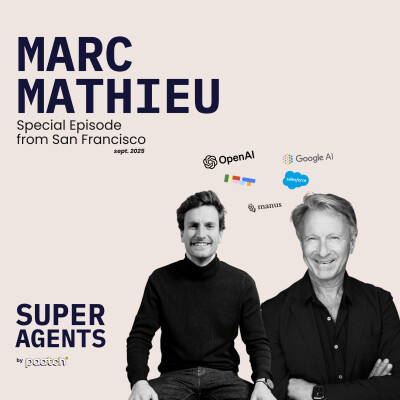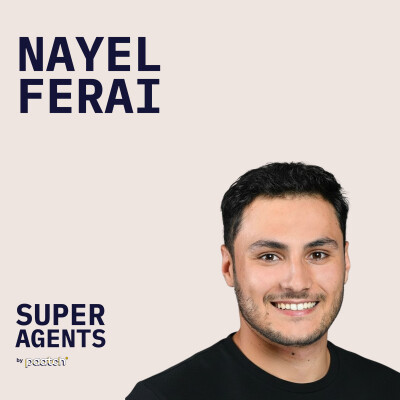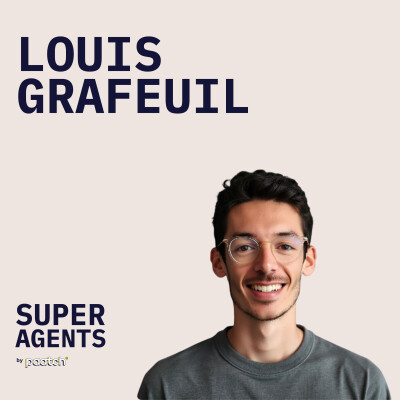- Speaker #0
Hey Mark!
- Speaker #1
Hey Niels!
- Speaker #0
So we're here in San Francisco downtown we just left like Google Office with you and we met Gary and in the past like 48 hours it was like a bit intense since the event with Dust here.
- Speaker #1
It was, it was. We had I think the best we could. See in what used to be my adoptive time, my adoptive town, Salesforce. You know, when I was here, I came here regularly to work with Salesforce, where I spent five years leading AI transformation. And it was good to now, you know, come with you now that I've gone rogue and, you know, going rogue with Patch, bringing Patch to San Francisco to make Patch become international. with the first Dusty event here and also the people we met from Salesforce, from Google AI, from OpenAI. It was very much a Bay Area induction for Patch.
- Speaker #0
Yeah, I was thinking about Rogue and the Salesforce Tower. I was looking at it this morning when we arrived and I was thinking, okay, like during the... 48 hours, we met a lot of people, like influential people in the AA space. They are not on top of the Salesforce Tower, they are more in the ground in these offices. And I feel here that in many underground places and then like classic now open spaces and many like I mean rogue spaces, that's where the space is like boiling and where things are about creativity and no Is it wrong?
- Speaker #1
It's one of the beauty of the Bay Area. I mean it has, of course, good and bad, but one of the benefits is it's really an incubator for engineering creativity. And the time where everybody is talking about AI, here everybody's doing AI one way or another, whether it's vertically in the big towers or... You know, horizontally or as you say underground, we met lots of startups as well that do AI and everybody is trying to contribute to what's probably the biggest technical revolution that we are gonna see at least in this decade if not in this lifetime.
- Speaker #0
And there is a lot of speed in like the AI since GiaGPT was launched in November 2022 and Now I feel like two or three years later, the biggest challenge we, and that's one of the points of Patch now with the playgrounds, is about adoption. All the discussions we had during these two and two and a half days here was about either at the enterprise level or for the prosumer, as Isabella from Manus said, how are we going to have real use cases and real people? you know, adapt AI or agentic AI, I don't know. What do you think about that? Like, what's the point?
- Speaker #1
Yeah, I often, you know, go back to this recent statistic that 95% of the AI implementations have no ROI. And they don't have ROI because they are basically, you know, there's lots of proof of concepts, but that don't scale. Or you try to boil the ocean, but... unless you have a meaningful, it's not even adoption, it's adoption and then integration in your daily work, then it cannot have an impact. And that's why it's actually easier to see the impact in smaller organizations because then there is no process, no bureaucracy, no big teams that need to approve everything. that gets integrated for good reasons, including security and data protection. But that's why you're right, Isabella's point about the focus on prosumer is interesting because that's really where you can very quickly adopt AI and deploy it on a day-to-day basis. What I find really interesting is in the people we meet you really start to see a disparity between the people with AI and the people without AI and more and more you have people who think they are with AI because they use GPT but the real people with AI is the people who have started to really you know make it part of their team. part of their day-to-day in multiple other tools, not just the mainstream tools.
- Speaker #0
There is a kind of necessity of psychological switch for any individual in companies and in organizations to be sure they have an individual ROI. I feel this. And then I really wonder what's the best methodology to go from these individuals. having this switch like psychological with chat gpt or using daily lms whatever the way they they do and what do you think will be like the switch at an organization level like is it because the it director will be okay like dust are basically selling because we were organizing here the first playground for patch with dust and i love the way they are you you know like implementing a workspace at the organization level and any individual inside their business process can create their own agent. It's a little bit different than what Manos is doing with the Prosumer one. What do you think, with your vision as former Salesforce SVP, AI transformation, what do you think will be the good methodology to help the switch at an organization level?
- Speaker #1
To me, one of the big challenges for organizations, going back to trying to boil the ocean, is to identify... What is a use case that truly is very costly because of high human manual work and that is highly automatable through gentrification. And when you focus, again, on not everything that AI can do, but one area where there is a real cost. Due to a lot of human labor that can be easily automated into an agentic workflow, that's really where you can, I think, fast-track your adoption and prove to your own organization that you can have an ROI because you really focus on one area. To me, one of the mistakes that a lot of people make is they adopt or they think they adopt AI in general. When in reality it's much better to say I'm gonna do one thing with it and do it very well. And so that's one way of answering. The other one going back to what Gary was saying about FDEs, forward deployment engineers. Palantir was the first one because they really wanted to offer an end-to-end solution integration to develop at scale the concept of FDEs. But it feels like FDEs, true FDEs that really are here to help not just adopt but deploy the AI inside a team, inside an organization are essential.
- Speaker #0
I mean this morning I heard this about FDEs, I think one of our first meetings also was about talking about FDEs. but do you think these ADEs will be replaced also by AI or agentic AI in the future? Is it like the vision because that's what occurred with like other employees in such organizations like tech organizations now?
- Speaker #1
There probably will be but it's gonna be some time before you can have agents you know deploy themselves I do work with some of the companies I advise as part of Rogue on agents that even create other agents. And indeed, you could imagine a world where there is no humans. And that's not to hope and not to aspire. We need to make sure that there's still a human in the room. But I think it's going to take some time because there is a lot of people, especially in the larger organizations. But even in the medium ones, there's a lot of people that need to integrate AI into their job, into multiple facets of their job. So that's why I'm saying start small, one area, but that really can be, if you make it right, can have a significant impact and solve a problem because very often A lot of those intents, I was talking with a startup entrepreneur this morning, was telling me, where you have huge human labor need, like it or not, today there is... lots of subcontracts because you don't have enough employees to do what it takes to manage or administrate a lot of your internal processes. And so identifying areas where there can be an immediate ROI, to me, is the way to go.
- Speaker #0
And another question for you, also I had during this short stay here in San Francisco, is that Do you think, well like the labs are, we saw yesterday like the big fundraising from Anthropique, OpenAI is doing like quite well of course. So what do you think because all the companies we are working with, with Patch is more at the, you know, the use case level let's say. They are like agents, very specific agents, agents for coding for lovable and we saw all the growth of lovable which is like incredible. Do you think like the growth and the You know, the market from agentic and LLMs will be driven by this kind of enterprise, like all these startups in series B, series C with high growing, or will it be the labs and like all the applications, let's say, chat GPT, codecs, operators? What do you think about this?
- Speaker #1
I think it's a combination of both. I think we're going to continue to see lots of innovation from the big. You know, Anthropix and OpenAI of this world really are developing the next iteration of AI capabilities, of new models that are going to go beyond even LLMs. But then, back to the point of identifying use case, I think that we're probably going to see lots of... Startups raise significant amount of money and we heard, you know, the people who talked to us were talking about raising money, we're not talking about hundreds of thousands of dollars but tens of millions or more and the reality is it's very often on taking a very specific use case, specific application and saying we're gonna build for that and then you can always expand. But I think that the idea that there's going to be almost model investment and technology development, but there's also going to be lots of application companies that are going to raise tens of millions of dollars to develop a very specific application of one or a combination of models.
- Speaker #0
That's crazy. Yeah. And do you... It's more like... For your vision, you are always more high-level reflections since I know you. So do you think if people have all adopted AI in, let's say, 10 years, like everybody is using AI daily, it will change the purpose of life of people? They will probably work entirely... differently like if agents are doing their work like what do you think will be the purpose for all these individuals but also for organization like what the goal yeah i mean i i recently
- Speaker #1
wrote an article on indeed as the us was celebrating labor day on the future of work and and it's true that since the industrial revolution we've basically been defining almost work as our identity, but if you think about how the industrial revolution disrupted the agricultural era, work, life, identity, society has completely changed. And I think we're at the very beginning of a similar change, probably a significantly more transformative change because of the nature of AI. And I think it's probably going to force us to reflect on, you know, is work the only thing that we aspire to do? You know, you often say the Americans live to work and the French work to live. Well, maybe it's a time for some of the French mantras to actually say maybe we need to live to... Not work, but live to play a little bit more, to be a little bit more curious, more inquisitive, more social, more humans. And I think that finding a way to apprehend and anticipate. How AI is going to change the way we live and who we are as a human race is one of the things that keeps me up at night for sure.
- Speaker #0
That's the good version and that's the good vision for AI, not the other one.
- Speaker #1
I'm talking about a little bit, so indeed my permanent search for disruption. So what about Patch and Niels? to me what was great about You know, Niels in San Francisco, it was always said, you know, you need to go international with Patch. And I felt that not only you came to the US this week to really continue that journey with the Patch Playground, but also to really think how, and I'm sure you're going to come back, how you could really become a... an international platform and now the vibe that there is in san francisco not the vibe coding but the vibe of technology of both of it is uh is probably uh contagious for patch contagious for me contagious for patch for you i think and of
- Speaker #0
course i'm gonna be back in i think in november because there are a lot like a lot of uh big events and that's uh in two months for me so So it will be like... A good time frame to be sure we're gonna be back with a bigger events with like the partners We we have met like in the industry last days So for sure it and that's that's the earth of the gen.ai ecosystem the labs are here The big techs are here and they are working on the subject on topic also. So yeah for sure. It's like unlocking a lot of Potential for me. So thank you for being here with me.
- Speaker #1
Well, I was glad to come It was great to basically come back to San Francisco and open the doors times and open some of the doors that, you know, I have access to for you to basically build that that layer of adoption, which, as we said at the beginning, is critical in the world of AI and it's going to be huge for the years to come.
- Speaker #0
Yeah. Let's do it now.
- Speaker #1
Yeah. Looking forward to see you in November.
- Speaker #0
Yeah, see you in November. Bye.
- Speaker #1
Bye.





